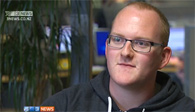An Australian doctor who is a member of the Exclusive Brethren Christian sect has been banned from practising as a General Practitioner after he prescribed chemical castration to a gay teen who sought a "cure" for homosexuality, according to Australian media reports on Wednesday.

Dr Mark Christopher James Craddock, 75, wrote the 18-year-old patient, who was at the time a member of the same Exclusive Brethren church the doctor attended, a prescription for the anti-androgen drug cyproterone acetate (sold under the brand name Cyprostat) during a 10-minute consultation in his home in February 2008. Dr Craddock gave the New Zealander teen a prescription for Cyprostat as well as five repeats. The drug, which lowers libido by reducing the amount of testosterone, is used to treat prostate cancer and to chemically castrate violent sex offenders.
According to the Sydney Morning Herald, in a letter of complaint to the Health Care Complaints Commission, the patient said when he came out as gay, a church leader told him, "there's medication you can go on".
"He recommended that I speak to Dr Craddock on the matter with a view to my being placed on medication to help me with my 'problem'," said the man.
Now 23, Craig Hoyle said in a recent TV interview says he had sought help from the church leaders when he realised he was gay at the age of 16.
“I believed homosexuality was a sin, that the church could help me cure, so for the next few months they did everything they could to try and change me,” he was quoted as saying on 3news.
“There were prayers, and I was told I had demons, and none of it worked.”
But it wasn't until he left the church in 2009 that he plucked up the courage to lay a complaint against the doctor.
“To know that he's not going to be able to do this to anyone else is a significant step,” he says. “I’ve known all along what he did was wrong, but to have that acknowledged by the medical board is important to me.”
In a hearing before the professional standards committee of the Medical Council of New South Wales in June, Dr Craddock admitted he did not obtain a medical history, conduct a physical examination, take an adequate sexual history or arrange a follow-up appointment. Nor did he refer the patient to a counsellor or a psychologist, despite the drug manufacturer's recommendation, and did not order a liver test or discuss the side effects, which include impotence.
Dr Craddock conceded it was potentially dangerous for a patient to have that much medication unsupervised. He said, in hindsight, he should not have prescribed it at all.
Last month the committee found him guilty of unsatisfactory professional conduct. In its decision of 23 August 2012, the Medical Professional Standards Committee ordered that Dr Craddock be severely reprimanded and that conditions be placed on his registration, including that he only practices in the field of radiology; and only prescribes medication in his place of practice as part of radiology treatment, other than in emergency situations.
The full decision is available on the Medical Council of NSW website.
